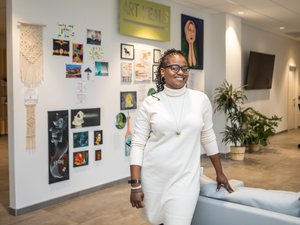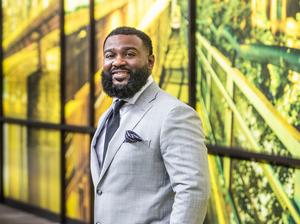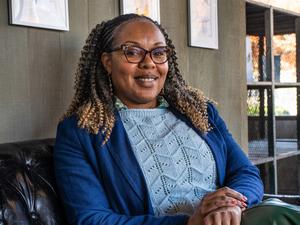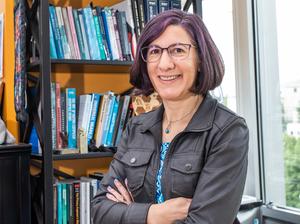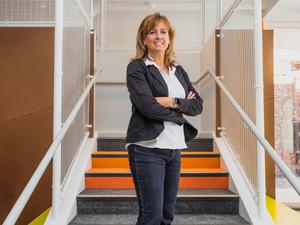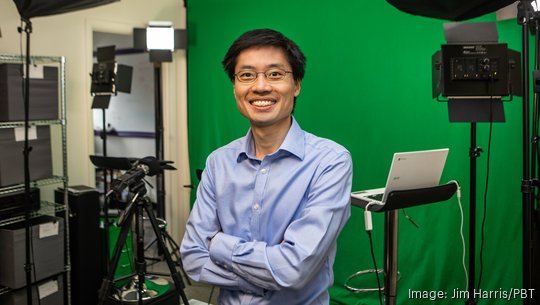
Po-Shen Loh is a math professor at Carnegie Mellon University and the national coach of the U.S. International Mathematical Olympiad team. He’s also an entrepreneur and the founder of Expii, the parent company of LIVE, an online tutoring platform where he employs dozens of high school students across the country who teach interactive mathematics lessons. His teaching style philosophy, which focuses on helping students generate their own ideas on how to solve questions, has him confident that the future of education will always require the quick-spirited demands of human-led instruction despite the rise of powerful artificial intelligence tools.
How do you describe what you do?
I’m really not quite sure what I do; I still have to figure it out every morning when I wake up. I am a math professor at Carnegie Mellon University, so definitely if you’re in my class, I am going to be in class with a piece of chalk, teaching something, or rather trying to see if you can brainstorm your own idea because actually the classes that I teach, whether at Carnegie Mellon or anywhere else in the world, they’re not teaching you just some technique. … I teach people how to make their own ideas on how to solve questions, which is the most fun thing to do.
I do a number of other things, too, because I’m also the national coach of the U.S. International Mathematical Olympiad team. And when I became that I started to take on a view where I really do want to help a large, broad base of people across this entire country, and not only the people who already have resources or the people who are already good at math. I like to go all around trying to help people to be the most that they can be with regard to thinking. As you can see, I already have jumped across a couple of different topics because basically what happens is every morning I just think what does the opportunity space look like for me trying to improve the state of a lot of people’s lives in this world through increasing their human intelligence?
Do you believe that education as it is taught today is in jeopardy due to the rise of artificial intelligence?
The things that are in trouble are if you write down a flow chart saying, “I would start with this PowerPoint presentation, I will say these things. Here are the four standard questions that people ask, and here are the right responses to each of those questions.” Anything like that is in big danger.
And this is not only education; this is worldwide. Every industry. … [For example,] it used to be too labor-intensive for a programmer to code that flow chart because it would take too long to program that. The reality of the AI revolution is that now you don’t have to write the code that encodes the flow chart. [The AI] can learn the flow chart by giving enough examples. Anything that has a simple flow chart you can in five to 10 years run something, learn it and pass the whole thing through a text-to-a-virtual-human and boom, you’ve got all of this.
We don’t teach in this way at all. In fact, the entire philosophy of how we teach is [showing] people how to come up with their own ideas. So our teaching style is like this. We give you a question that you’ve never seen before. Never. And we don’t expect you to know how to do it. In fact, we don’t want you to know how to do it. And it’s not only you, it’s you with some 20 or 30 other people who are just like you. This is very important. And then we challenge you all to collectively group brainstorm to try to figure this out. As the group brainstorming happens, these 20 to 30 people are generating ideas … from left field all over different areas of math. They don’t know how to solve it. So they’re like, “Oh, could I use this thing about triangles? Can I use this thing about length? Oh, I heard about angles,” all this stuff. The job of the facilitators, the instructors, is to take all of those ideas and swim with them. If somebody starts using an idea from a math class that is one year later than what they’re taking right now, no problem. Quickly teach everyone what that word means and swim with them on that idea. If they suddenly come up with something that nobody ever teaches in school but actually works, the job of the instructor is to go along with that and figure out if it works.
And this philosophy also manifests in the LIVE online video tutoring platform you founded, where exceptional math students in high school aid their middle school-aged peers?
So active [instructors] right now, it’s probably in the 30 to 50 range. I lost track. I know that we have about 100 high school students in the pipeline, meaning people who are in training or who are actively teaching or who have graduated from the program. See, the interesting thing is it’s a pipeline in the sense that the big difference between what we’re doing and the standard education infrastructure is that we don’t expect any of these people to do this for a career. Usually in this whole [tutoring] industry, the way it works is you find people and this is their career. We are doing a pipeline — there’s an entire pipeline of middle school kids who need to learn, and there’s another pipeline of high school students who actually need to [improve their social skills]. And what’s going on is we’re getting the very, very best in the entire country from the math ability spectrum, the very best, and they’re all in here because it’s part of helping them win at life. What is the high school student getting out of this? This is not community service. In fact, this is directly helping [them].
If you could be on vacation anywhere in the world right now, where would you want to be?
I’ll say the Philippines right now. I would like to understand the Philippines in much greater detail. I was actually there for the first time in January, this past January. I’m going back again in March.
BIOBOX:
Title: Founder/CEO, Expii, and professor, Carnegie Mellon University
Age: 40
First job: Computer science research assistant at Caltech
Current residence: Squirrel Hill
Education: B.S., math, Caltech; M.S., math, University of Cambridge; Ph.D., math, Princeton University
Family: Wife Debbie Lee, daughters Vivian Loh and Diana Loh, son Vincent Loh
Hobbies: Travel and understanding cultures and communities around the country and world
Causes: Helping people discover their potential
